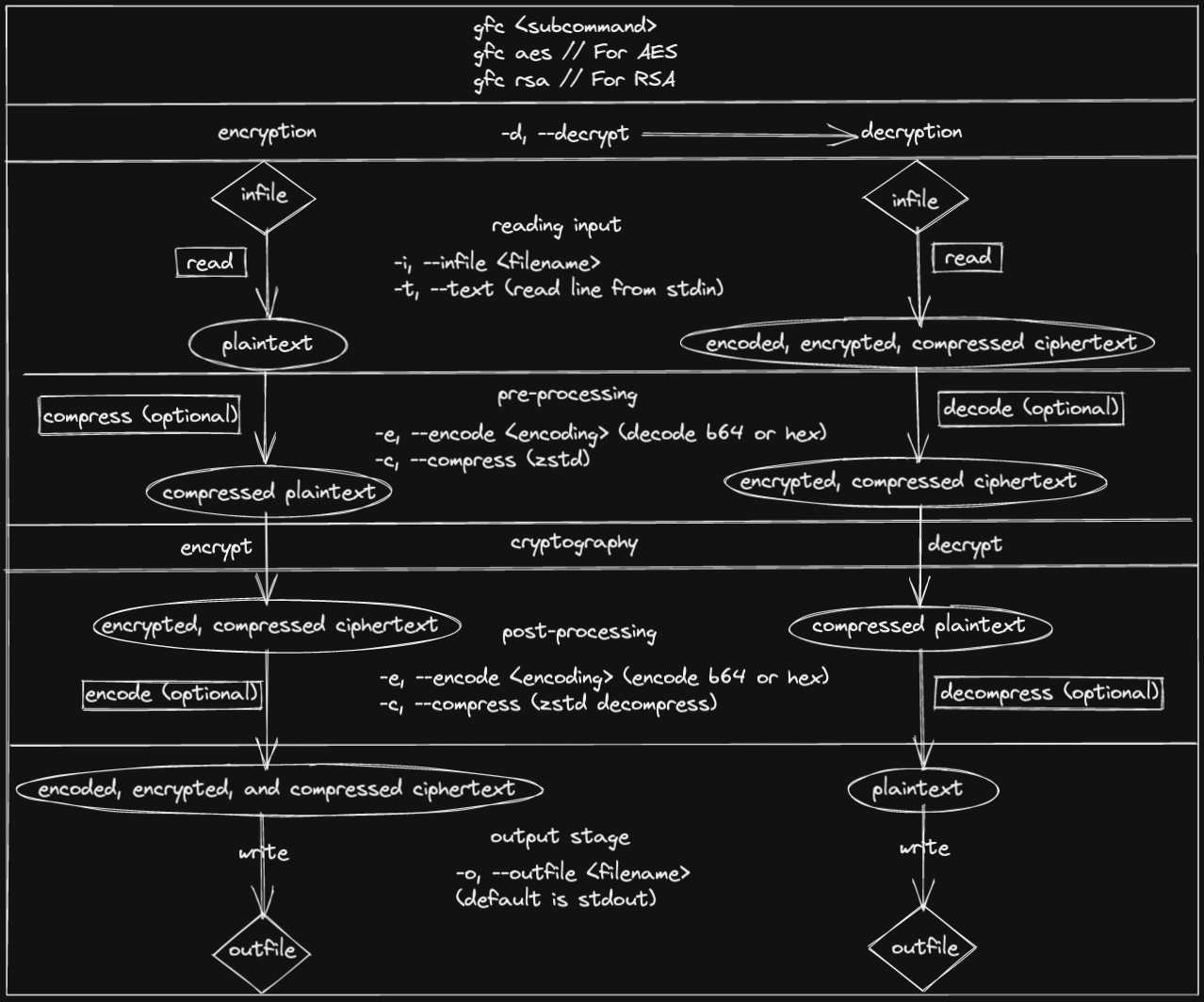 artnoi
artnoiAug 14, 2020
So I was relatively free last week, so I updated my most beloved program, gfc, which was also my first real program. Within a window of 3-4 days, I had refactored the hell out of it and also added ZSTD compression, XChaCha20/ChaCha20-Poly1305 encryption to the little program, all while remaining <4.5MB in binary size, which is similar to the code before refactoring.
My initial goal was simple - I want to rewrite the CLI parts of the program so that it is more coherent and intuitive for users. Before this, gfc only used the Go standard library flag package for CLI flag management. It was ugly, and it felt like this was not a free UNIX CLI tools.
This is the last commit of the classic gfc CLI code:
In the commit, you can see that main was pretty messy. It had to handle all exceptions using if blocks. As you can see in the code, this will make it extremely difficult to add new features such as compression, or a new encryption cipher.
Before the rewrite, gfc took arguments like this:
gfc -m CTR -i plain.txt -o enc.bin
This looks fine, however, there’s no long flag support in the flag package, so the following was impossible:
# Not possible if we used flag package
$ gfc --mode CTR --infile plain.txt --outfile enc.bin
And because there’s only on big flags struct defined in main, this means that both AES and RSA used the same CLI flags, and that we cannot use -k for both symmetric and assymetric keys.
My previous stand was that I wasn’t going to be using non-stdlib package for building the CLI, but flag limitations are really getting in the way. I don’t want to focus my efforts on handling arguments/flags. So I started looking for external dependencies for CLI.
There were 2 contenders - github.com/urfave/cli (~18k GitHub stars) and github.com/alexflint/go-arg. I ultimately chose the latter (go-arg) because of smaller dependency list and I don’t need all those extra functionalities offered by github.com/urfave/cli yet.
To refactor the CLI parts, I added a new cli package, and decide to have only 1 implementation of the CLI, via the interface cli.command. Different algorithms will instead be implemented as a new struct, which implements cli.command.
cli.baseCryptFlagsTo standardize the basic stuff that all algorithm structs in package cli have to deal with, like infile and outfile specification, compression and encoding flags, I created a new struct cli.baseCryptFlags. baseCryptFlags partially implements cli.command,so that new algo struct can just embed baseCryptFlags and inherit all the standard flags. This allows me to easily add new encryption algorithms.
Now that each algorithm subcommand is a struct, like rsaCommand for RSA, we can now create a new exported struct cli.Gfc that will hold all these subcommands. This makes gfc CLI similar to other CLI programs that use subcommands, like git.
cli.Gfc.Run() - aka the true main()Now that we have all these subcommands implementing the same interface subcommand, we can write a method for cli.Gfc that can handle all subcommands and all the flags.
To do this, I divide gfc logic into 4 different stages.

Read infile
If user doesn’t specify infile, os.Stdin file is used as infile. And if stdin is used, it must not be closed.
Preprocess
Now is the time where compression occurs when encrypting, or where decoding occurs when decrypting a gfc-encoded file.
Cryptography
This is when encryption/decryption takes place. It is handled by the algorithm subcommand’s crypt method.
Postprocess
Now is the time when gfc performs decompression (when decrypting), or encoding (when encrypting)
You can see all of this in file cli.go.
Now that the main logic is standardized in cli.Gfc.Run(), we can easily introduce new preprocessing/postprocessing tricks in the pipeline!
First thing I want to do is to add some kind of compression for gfc, and I chose Zstd for its pretty great compress ratio and fast decompression time. The compression is actually pretty easy, but adding it as an option in the command line is even easier! Now you just add a new compress field to cli.baseCryptFlags!
And because now we can easily introduce new algorithm by just creating a new struct implementing subcommand, why not add ChaCha20 family to gfc? As a Wireguard user, I’ve always wanted to do this. ChaCha20 is faster in software than AES, and, it sounds cool.
I first added only XChaCha20-Poly1305, but later wrote generic functions for both ChaCha20 and XChaCha20 ciphers. So gfc has 2 new algorithm modes, and the code for this is very small. The code for XChaCha20/ChaCha20-Poly1305 is written in 2 files, one for the generic functions, the other for mode-specific functions.
After adding ChaCha20-family modes, I realized there’re some redundant code that’s not very obvious. So I tried to aggregate the logic for decoding and writing the final output stage for the Cryptography stage of gfc.
This led me to realize that some how, I can further refactor this logic! But now I’m too busy trying to configure my new infrastructure, so it may take some time before I can finalize this.
See ya!